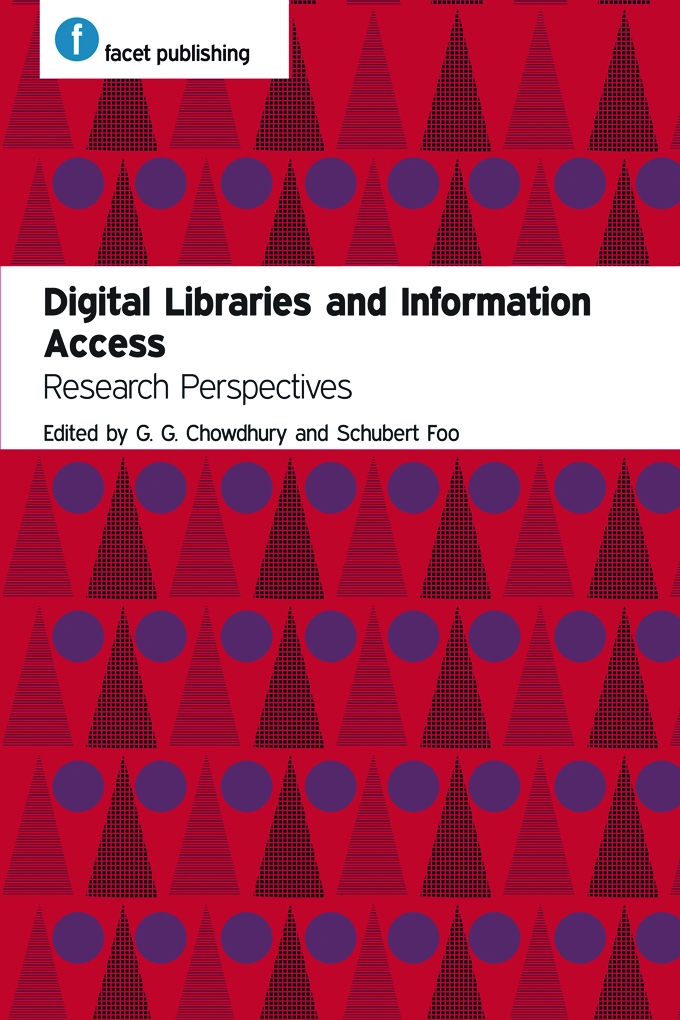Book contents
- Frontmatter
- Contents
- Foreword
- Editors and contributors
- 1 Digital libraries and information access: introduction
- 2 The design and architecture of digital libraries
- 3 Metadata and crowdsourced data for access and interaction in digital library user interfaces
- 4 Information access
- 5 Collaborative search and retrieval in digital libraries
- 6 The social element of digital libraries
- 7 Towards socially inclusive digital libraries
- 8 Users’ interactions with digital libraries
- 9 Digital libraries and scholarly information: technology, market, users and usage
- 10 Digital libraries and open access
- 11 iSTEM: integrating subject categories from multiple repositories
- 12 The usability of digital libraries
- 13 Intellectual property and digital libraries
- 14 Digital preservation: interoperability ad modum
- 15 Digital libraries and information access: research trends
- Index
- Miscellaneous Endmatter
1 - Digital libraries and information access: introduction
Published online by Cambridge University Press: 08 June 2018
- Frontmatter
- Contents
- Foreword
- Editors and contributors
- 1 Digital libraries and information access: introduction
- 2 The design and architecture of digital libraries
- 3 Metadata and crowdsourced data for access and interaction in digital library user interfaces
- 4 Information access
- 5 Collaborative search and retrieval in digital libraries
- 6 The social element of digital libraries
- 7 Towards socially inclusive digital libraries
- 8 Users’ interactions with digital libraries
- 9 Digital libraries and scholarly information: technology, market, users and usage
- 10 Digital libraries and open access
- 11 iSTEM: integrating subject categories from multiple repositories
- 12 The usability of digital libraries
- 13 Intellectual property and digital libraries
- 14 Digital preservation: interoperability ad modum
- 15 Digital libraries and information access: research trends
- Index
- Miscellaneous Endmatter
Summary
Introduction
Systematic research and development activities in digital libraries began just over 20 years ago, and during this short period of time the field of digital libraries has progressed significantly. Over the past two decades a large number of digital libraries have appeared in different countries that cover different subjects, and disciplines from health to science, engineering to arts and culture, and others. Likewise, digital libraries have been designed, developed and used by a wide range of user communities that include school children, academics, scholars, scientists and the general public. Different types of content have been created and stored in these digital library repositories, ranging from basic digital objects like photographs, music and film to more researchoriented scholarly, scientific and research data.
Alongside this, a significant amount of resources and efforts have been invested in research into digital libraries that have given rise to over 8000 journal and conference papers and a large number of books, theses, research reports and other kinds of scholarly publications. Experts from a number of disciplines, like library and information science, computer science, engineering, psychology, business management, law, economics and others, have joined hands to address and resolve a variety of research issues and challenges associated with digital libraries.
The field of digital libraries has evolved significantly over the past two decades, both in terms of the nature and characteristics of research and in terms of the objectives and functionalities of digital libraries. While the first phase of digital library research in the early 1990s put the focus on building technologies for management of large volumes of digital information for remote access, this focus subsequently shifted to users, usability and impact studies, open access and so on. Subsequently, with the rapid progress in web and social networking technologies, the focus of digital library research has been extended to new and upcoming challenges such as semantic access, social information retrieval and social network analysis (see for details, Theng et al., 2009; Borgman, 2007; Goh and Foo, 2007). Furthermore, digital library research that once focused primarily on content – books, journals, music, video etc. – is now being extended to managing research data as well as research output, i.e.
- Type
- Chapter
- Information
- Digital Libraries and Information AccessResearch perspectives, pp. 1 - 12Publisher: FacetPrint publication year: 2012



